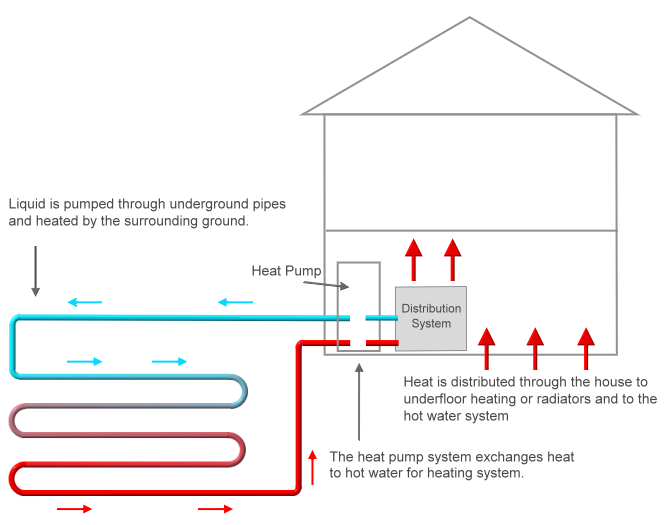Ground source heat pumps (GSHP) use pipes buried in the ground to extract the ambient heat from the earth and turn it into heat for your building. Here we look at how they work, how to tell if your home is suitable and some of the considerations you’ll need to take into account.
How a ground source heat pump works
A ground source heat pump involves burying pipes underground. In some applications this will involve a vertical bore hole being drilled directly down from the exterior of your property, whereas other systems will use coiled loops of pipework in trenches around the home.
These pipes contain a mixture of water and antifreeze which is pumped around the loop of pipes in the ground. As the liquid passes around the loop, the heat from the ground is absorbed into the mixture, raising the temperature slightly. When the liquid returns to the heat pump itself, a compressor works to raise the temperature to a higher degree. This heated water passes through a heat exchanger to heat the water for your hot water or central heating in the house, and the cooled liquid returns to the loop to complete the cycle again.

Is my home suitable for a ground source heat pump?
Heat pumps are not suitable for every home. Here are the things you will need to ask yourself to decide if this technology is right for you.
- Do I have enough outside space? As well as thinking about how the underground piping will be laid, you will need to have a garden flat enough, big enough and accessible enough to accommodate the drilling machinery.
- How do I heat my home now? Ground source heat pumps provide a significant financial and carbon saving for homes not connected to the gas grid. If you are on gas at the moment, the saving you will achieve with this investment is much lower.
- What heating system do I use? Ground source heating is delivered at a lower temperature than heating with gas or oil, so if you plan to continue using radiators and a boiler, you may need to oversize your radiators in order to achieve enough heat output. Ground source heat pumps work best with underfloor heating, so consider if this is an option for you.
- How will I heat my water? As the heat is delivered at a lower temperature you might want to consider having an electric immersion to top up the heat to the desired temperature for domestic hot water. If the budget allows, you could even consider solar water heating to provide a boost to your pre heated hot water supplies.
- Is my home well insulated? Before considering any renewable heat technologies, it is important to ensure your home is as well insulated as it practically can be, otherwise you’ll be generating heat that just gets wasted.
Other considerations about ground source heat pumps
There are some pros and cons to consider before installing a ground source heat pump for your home. On the positive side, ground source heating is less CO2 intensive than heating with fossil fuels, and although it uses electricity to work the pump, the coefficient of performance is around three. This means that for every one unit of electricity you put into the system, you receive three units of heat back out, making it highly efficient. If the electricity consumption concerns you, you could always combine the heat pump with a photovoltaic system to make it completely green.
Another positive is that ground source heat pumps are eligible for the Renewable Heat Incentive (RHI) and the Domestic Renewable Heat Incentive meaning you can receive tariff payments under the relevant scheme.
There are some negative points to consider too. The main issue that puts householders off from installing heat pump technology is the high initial cost of installation. Depending on the groundwork that needs to be done, ground source heat pumps can cost from £14,000 to £19,000+ to install. The act of installing the technology can be messy and disruptive too, and if you plan to install underfloor heating as part of the process, this can cause disruption inside the home as well as outside.
Conclusions
Overall, ground source heating is a perfect solution for people in well insulated homes with adequate outside space, who are not on the gas network. For new build properties in particular, this is an amazing technology that will provide free heat for many years to come. However, for gas heated homes or older, draughtier properties, there may be a better solution to consider.
If you would like to find out more about how heat pumps might work for your project, you can find and contact ground source heat pump installers in our directory.




